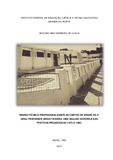Ensino técnico profissionalizante no ensino técnico profissionalizante no centro de ensino de 2° grau professor Anísio Teixeira: uma análise histórica das práticas pedagógicas (1974 A 1985)

Visualizar/
Data
2017-04-10Autor
Costa, Antonio Max Ferreira da
http://lattes.cnpq.br/6446532208962557
Metadado
Mostrar registro completoResumo
This dissertation deals with a historical analysis of the pedagogical practices of the
Secondary Education Center Professor Anísio Teixeira, with a temporal cut in the
years 1974-1985. Its specific objectives are to reflect on Human Capital Theory,
Technical and pedagogical practices in the context of the Brazilian military civilian
dictatorship; To investigate the technicism in Brazil, observing the repercussion of
Law Nº 5.692 of August 11, 1971, within the scenario of pedagogical practices of the
Secondary Education Center Professor Anísio Teixeira; Re (construct) the history of
Vocational Technical Education based on the pedagogical practices experienced
during the years 1974 to 1985, in this school institution. This work is based on
theoretical references of the history of institutions, school culture, professional
education and the science of education, based on the studies of Magalhães (1996);
Faria Filho (2001); Nosella; Buffa (2010); Julia (2001); Le Goff (1996); Chartier
(1988); Saviani (2013); Schultz (1973); Frigotto (1999); Germano (2001); Marx
(1868); Antunes (2009); Cunha (2005); Skinner (1972), Libran (1994); Luckesi
(1995), Hoffman (2016, 1993); And Bobbitt (2004), among others. For the
construction of this dissertation was used as methodology the qualitative research of
historical nature, initially performing a bibliographical and documentary survey in the
archives of the research school, highlighting Law No. 5.692 / 71. It is also evidenced
in this dissertation, as a data research tool, the construction of personal letters
constructed with focus on the re (construct) of the representations about the teaching
practices of the highlighted teaching, centered on the profile of the students,
curriculum, contents, methodology, Evaluation, parties and events. This bookkeeping
allowed us to conclude that the vocational technical education of the second grade,
carried out by the school in question, consisted of an eminently technical education
focused on the son of the working class, in which the teachers materialized the
pedagogical principles of technicalism based in Brazil in the years of 1971 to 1985.



